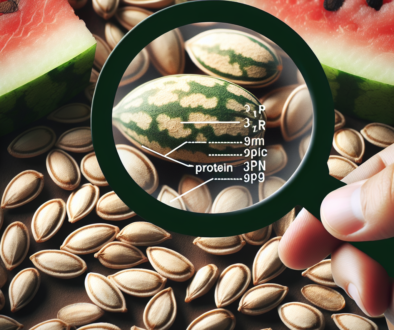How Many Carbs Are in a Cup of Watermelon?
-
Table of Contents
- Carb Content in a Cup of Watermelon: A Nutritional Overview
- Understanding Carbohydrates in Fruits
- Nutritional Breakdown of Watermelon
- Carbs in Watermelon: A Closer Look
- Health Benefits of Watermelon
- Incorporating Watermelon into a Low-Carb Diet
- Conclusion: Balancing Taste and Nutrition
- Discover ETprotein’s Protein Products
Carb Content in a Cup of Watermelon: A Nutritional Overview

Watermelon is a refreshing and hydrating fruit that’s a staple at summer picnics and barbecues. But for those watching their carbohydrate intake, whether for diabetes management or a low-carb diet, understanding the carb content in watermelon is essential. This article delves into the nutritional profile of watermelon, focusing on its carbohydrate content, and provides insights into how this fruit fits into a healthy diet.
Understanding Carbohydrates in Fruits
Before we specifically address the carb content in watermelon, it’s important to understand the role of carbohydrates in fruits. Carbohydrates are one of the three macronutrients (alongside proteins and fats) and are a primary source of energy for the body. Fruits contain naturally occurring sugars, which are a form of carbohydrate. These sugars, along with dietary fiber, contribute to the total carbohydrate count of the fruit.
Nutritional Breakdown of Watermelon
Watermelon is not only delicious but also low in calories and rich in vitamins, minerals, and antioxidants. A typical serving size for watermelon is one cup of diced pieces, which equates to approximately 152 grams. Here’s a closer look at the nutritional content of this serving size:
- Calories: 46
- Total Fat: 0.2g
- Sodium: 2mg
- Total Carbohydrates: 11.5g
- Dietary Fiber: 0.6g
- Sugars: 9.4g
- Protein: 0.9g
- Vitamin C: 12.5mg (14% DV)
- Vitamin A: 865 IU (17% DV)
As you can see, a cup of watermelon contains about 11.5 grams of carbohydrates. However, it’s important to note that the net carbs, which are calculated by subtracting the dietary fiber from the total carbs, would be approximately 10.9 grams per cup.
Carbs in Watermelon: A Closer Look
The carbohydrates in watermelon come primarily from natural sugars, including fructose, glucose, and sucrose. These sugars are responsible for the fruit’s sweet taste. Despite its sugar content, watermelon has a low glycemic index (GI) of around 76, which means it has a moderate impact on blood sugar levels.
Watermelon also contains a high water content, about 92%, which makes it particularly hydrating and low in calorie density. This means you can eat a larger volume of watermelon for fewer calories, making it a great option for those looking to manage their weight.
Health Benefits of Watermelon
Beyond its carbohydrate content, watermelon offers several health benefits:
- Hydration: Due to its high water content, watermelon helps keep you hydrated, which is crucial for maintaining healthy body functions.
- Nutrient-Rich: Watermelon is a good source of vitamins A and C, which are important for skin health and immune function, respectively.
- Antioxidants: It contains antioxidants like lycopene, which has been linked to reduced risk of certain types of cancer and heart disease.
- Anti-Inflammatory Properties: The fruit has anti-inflammatory compounds that may help reduce inflammation in the body.
- Muscle Soreness: Watermelon juice has been shown to reduce muscle soreness after exercise, likely due to its amino acid content.
Incorporating Watermelon into a Low-Carb Diet
For those on a low-carb diet, watermelon can still be enjoyed in moderation. Its net carb content is relatively low compared to other fruits, and it can be paired with foods high in healthy fats and proteins to balance out the meal. For example, a cup of watermelon with a handful of nuts or a slice of cheese can make for a satisfying and balanced snack.
Conclusion: Balancing Taste and Nutrition
In conclusion, a cup of watermelon contains approximately 11.5 grams of carbohydrates, making it a relatively low-carb fruit option. Its high water content and rich nutrient profile offer numerous health benefits, from hydration to the provision of essential vitamins and antioxidants. When consumed in moderation, watermelon can be a delicious and nutritious addition to any diet, including those that are carb-conscious.
Discover ETprotein’s Protein Products
If you’re looking to complement your diet with high-quality protein sources, consider exploring ETprotein’s range of plant-based protein products. Whether you’re a fitness enthusiast, someone with dietary restrictions, or simply looking to enhance your nutrition, ETprotein offers a variety of options to suit your needs.
About ETprotein:
ETprotein, a reputable watermelon seed protein Chinese factory manufacturer and supplier, is renowned for producing, stocking, exporting, and delivering the highest quality organic bulk vegan protein and plant proteins. They include Organic rice protein, clear rice protein, pea protein, clear pea protein, watermelon seed protein, pumpkin seed protein, sunflower seed protein, mung bean protein, peanut protein etc. Their offerings, characterized by a neutral taste, non-GMO, allergen-free attributes, cater to a diverse range of industries. They serve nutraceutical, pharmaceutical, cosmeceutical, veterinary, as well as food and beverage finished product distributors, traders, and manufacturers across Europe, USA, Canada, Australia, Thailand, Japan, Korea, Brazil, and Chile, among others.
ETprotein specialization includes exporting and delivering tailor-made protein powder and finished nutritional supplements. Their extensive product range covers sectors like Food and Beverage, Sports Nutrition, Weight Management, Dietary Supplements, Health and Wellness Products, and Infant Formula, ensuring comprehensive solutions to meet all your protein needs.
As a trusted company by leading global food and beverage brands and Fortune 500 companies, ETprotein reinforces China’s reputation in the global arena. For more information or to sample their products, please contact them and email sales(at)ETprotein.com today.












